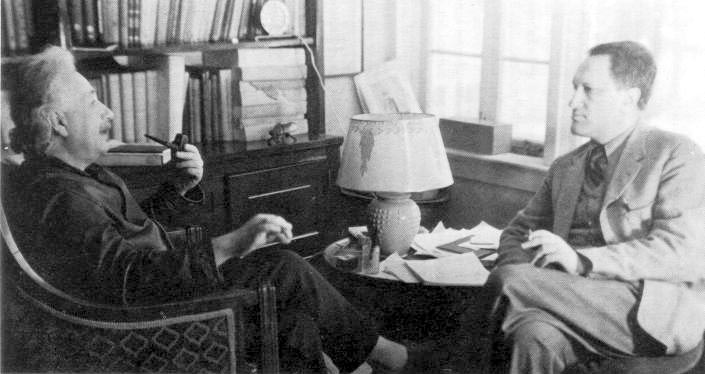- Albert Einstein
(1879-1955), Physics, Zurich 1905, "Über Eine neue Bestimmung der Moleküldimensionen"; habilitation 1908, Bern.
- His collaborator:
Leopold Infeld, theoretical physics (1898-1968), who worked in Princeton with Einstein (1936-38) and together they wrote
"The Evolution of Physics" in 1938 (the book had over 70 editions). Formally Infeld defended his PhD in 1921 under Władysław Natanson.
- His student:
Wiesław Woźnicki
(1933-95), theoretical physics, Warsaw University, PhD 1958.
- His student: Jacek Karwowski (1940), theoretical physics, Nicolaus Copernicus University, PhD 1966.
- I was the second student who obtained PhD under supervision of prof. Karwowski (1980).
Full Neurotree.

Albert Einstein discussing with Leopold Infeld
My former PhD students (see also Neurotree above), most are now professors at different institutions:
- Jarosław Meller, New computational algorithms based on the Configuration Interaction Method.
Defended at the Nicolaus Copernicus University, Toruń, June 1996.
- Norbert Jankowski, Ontogeniczne sieci neuronowe w zastosowaniu do klasyfikacji danych medycznych (Ontogenic neural networks in applications to the medical data classification).
Defended at the Institute of Biocybernetics and Biomedical Engineering, Polish Academy of Science, Warsaw, March 2000 (completed DSc in 2012).
- Rafał Adamczak, Zastosowanie sieci neuronowych do klasyfikacji danych doświadczalnych (application of neural networks to classification of experimental data).
Defended at the Nicolaus Copernicus University, Toruń, June 2001 (completed DSc in 2012).
- Antoine Naud, Algorytmy neuronowe i statystyczne w wizualizacji danych wielowymiarowych (Neural and statistical algorithms for visualization of multidimensional data).
Defended at the AGH University of Science and Technology, Cracow, September 2001.
- Karol Grudziński, Similarity based methods in application to analysis of scientific and medical data.
Defended at the Nicolaus Copernicus University, Toruń, November 2002.
- Krzysztof Grąbczewski, Zastosowanie kryterium separowalności do generowania reguł klasyfikacji na podstawie baz danych (Separability criterion applied to generation of logical rules for data mining).
Defended at the Systems Research Institute, Polish Academy of Sciences, Warsaw, June 2003.
- Mirosław Kordos 28.6.2005, Search-based Algorithms for Multilayer Perceptrons,
Defended at the Faculty Of Automatic Control, Electronics And Computer Science, Silesian University of Technology, Gliwice, June 2005.
- Marcin Blachnik, Systemy regułowe bazujące na prototypach oraz ich relacje z systemami rozmytymi w zastosowaniu do klasyfikacji danych (Prototype-based logical rule systems, their relations with fuzzy systems and their application to data classification).
Defended at the Faculty Of Automatic Control, Electronics And Computer Science, Silesian University of Technology, Gliwice, July 2007
- Julian Szymański, Wyszukiwanie kontekstowe w pamięci semantycznej (Context-based search using semantic memory).
Defended at the Faculty of Electronics, Telecommunications and Informatics, Gdansk University of Technology, April 2009.
- Marek Grochowski, Sztuczne sieci neuronowe oparte na metodach wyszukiwania interesujących projekcji (Artificial neural networks based on projection pursuit);
Institute of Computer Science, Polish Academy of Science, Warsaw, March 2013.
- Tomasz Maszczyk, Uniwersalne Maszyny Uczące (Universal Learning Machines). Institute of Computer Science, Polish Academy of Science, Warsaw, 2014.
- Paweł Matykiewicz, Neurocognitive inspirations in medical text analysis.
Institute of Computer Science, Polish Academy of Science, Warsaw, Sept 2015. Now at Microsoft, Seattle, USA.
- Darek Mikołajewski, Symulacje funkcji pnia mózgu (Computational simulations of brain stem functions). Institute of Biocybernetics and Biomedical Engineering, Polish Academy of Science, Warsaw, Oct 2015.
- Alexander Gravier, Neural Network Modelling of the Influence of Channelopathies on Reflex Visual Attention, co-spuervisor with Abdul Wahab and Quek Hiok Chai, SCE NTU, Singapore 2015.
- Krzysztof Dobosz, Stabilność wielowymiarowych układów neurodynamicznych (Stability of multidimensional neurodynamical systems, 3 positive reviews 9/2016.
- Karolina Finc, Dynamics and plasticity of human brain functional network during working memory task performance. 09/2019.
- Kamil Bonna, Neural correlates of prediction errors during reward and punishment learning (10/2018-9/2022)
- Michał Komorowski, Locally specific human brain dynamics automatically modeled using spectral features of MEG/EEG signals (since 10/2016, defense 11/2022)
- Ewa Ratajczak, Microstate neurodynamics in HRV biofeedback (since 10/2011, defense 12/2022)
Current PhD students:
Łukasz Furman (started 10/2021)
Simone Poetto (started 10/2021)
Sinem Serap (started 9/2022)
Krzysztof Tołpa (external, 2022)
Many candidates dropped out after short time, a few moved to other supervisors after several years:
Krystian Dereziński (started 10/2021)
Monika Boruta-Żywiczyńska (since 10/2018-2022, finished in 5/2023 with another supervisor)
Jan Nikadon (since 10/2016)
Maciej Pilichowski, Computational Creativity (working full time, thesis written but never submitted)
Leszek Rybicki (now working in Japan; thesis submitted but not defended)
Filip Piękniewski (in the last year moved to another supervisor).
Wojciech Skaba (1 year in 1990).

